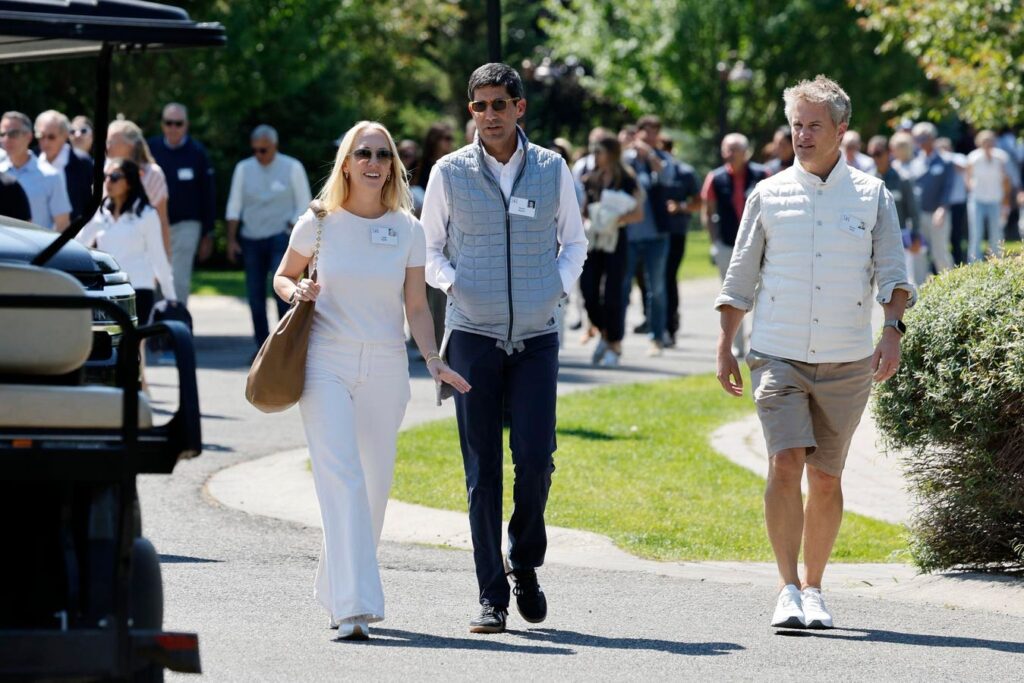SUN VALLEY, IDAHO – JULY 10: Julia Hartz, CEO of Eventbrite, Kevin Warsh, and Kevin Hartz, former … [+]
Back in March of 2020, former Federal Reserve Board member Kevin Warsh penned an opinion piece for the Wall Street Journal (“Let the Fed Administer an Antiviral Shot”) calling for the Federal Reserve to provide “liquidity” to American businesses crushed by lockdowns instituted by coronavirus-panicked politicians. Instead of recommending a cessation of the lockdowns that were bankrupting and desperately impairing businesses (not to mention the loss of jobs alongside soaring poverty the world over), Warsh called for more government despite government’s direct role in our economic collapse.
The main thing is that you can’t shut down economic activity for weeks and months as was done in 2020 around the world, and not feel the price implications of such moves for years after. About the previous assertion, it’s no insight. It’s just basic economics. Work divided among as many hands and machines as possible is the stuff of falling prices, so when panicky politicians break up this division of labor for weeks and months it’s only logical that higher prices borne of less global cooperation will reveal themselves for a long time.
Why isn’t or hasn’t Warsh stated the obvious about the price impact of drastically impaired global cooperation? One speculation is that since he publicly called for the very government spending that enabled the lockdowns, it’s difficult for him to admit now the fruits of the awful policy that followed in 2020, and that included trillions worth of spending signed into law by then President Trump. Just the same, it’s true as Warsh alludes in a more recent opinion piece that the lockdowns didn’t cause what so many refer to as “inflation.” Well, of course not. Command-and-control is not inflation, it’s command-and-control.
Where it becomes interesting is in Warsh’s contention from the same opinion piece that “inflation arose from a government that spent too much and a central bank that printed too much.” No, that’s not true. Unless Warsh wants us to believe that our federal government derives its spending power from Pluto, he must acknowledge that federal spending is a consequence of its taxing power. Using Warsh’s own words from the aforementioned opinion piece, “If the government lived with less, its citizens would live with more.” Meaning, there’s no price impact from government spending simply because governments can only spend insofar as those they tax have less to spend.
As for the “printed too much” line, please. It implies not just that markets are stupid, but ferociously so. Put another way, if we ever reach the point that our federal government is even considering the possibility of “money printing” to fund its expenditures, Treasury yields will skyrocket well in advance of such a scenario to reflect the mere possibility. Meaning, there’s nothing to the money printing story.
Warsh then writes that it’s the Fed that “has the power to ensure low and stable prices, so long as it sets monetary policy wisely and its credibility is unimpaired.” Except that no entity vying for credibility could believe something so at odds with reality, specifically the Fed having “the power to ensure low and stable prices.” It can ensure no such thing, and it can centrally plan no such thing. Prices are once again an effect of wildly sophisticated global cooperation, which is a reminder yet again that we have had high prices in recent years that had nothing to do with inflation, but everything to do with lockdowns that were paid for by government spending very publicly supported by Warsh.
Which is where it becomes a little bit odd. Warsh claims government spending causes inflation (it doesn’t), but then it was Warsh calling for government spending back in 2020 as the fix to an economy suffocated by lockdowns. Then-President Trump sadly signed into law trillions worth of new spending that very sadly enabled lockdowns nationwide.
Warsh asserts that “The Fed Can’t Pin Inflation on Trump,” and he’s right. There’s an ocean of difference between rising prices and inflation. But rational minds can blame Trump and policies supported by Warsh for the higher prices that followed the lockdowns, and that never would have revealed themselves absent a disastrous lapse of reason by the U.S. political class, including Republicans.
Read the full article here
